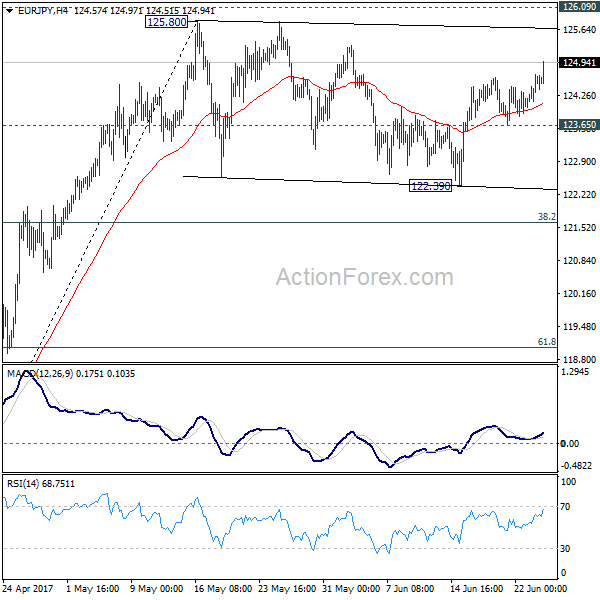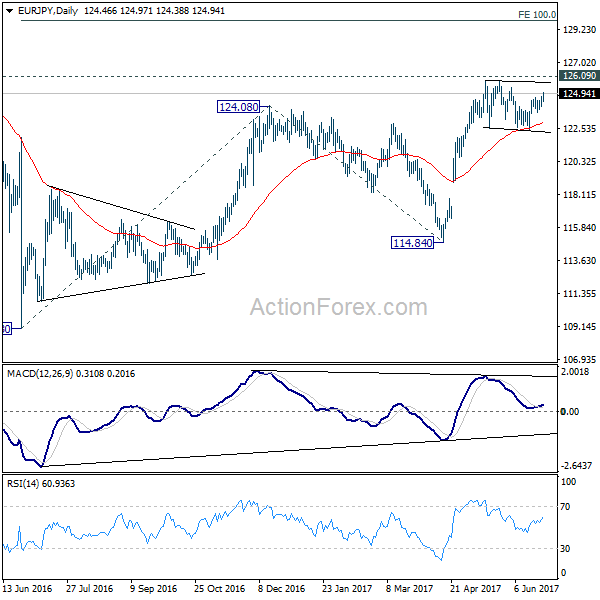Who is Kevin Hassett? Wolfe looks at the Trump ally tipped to become Fed Chair.
Yen weakness broadly today as market sentiments improved. Major European indices open higher with FTSE and DAX up 0.5% at the time of writing while CAC is up 0.8%. The development is helped by recovery in oil prices as WTI is trading back above 43 after dipping to as low as 42.05 last week. Swiss Franc also follow Yen and trades mildly lower. Strength is seen in Sterling and commodity currencies but upside is limited so far. Gold, on the other hand, suffered steep selling to as low as 1236.5 earlier today and is back at 1244.
BoJ opinions: Crucial to maintain stimulus
According to summary of opinions of June BoJ meeting, policy members believed there is need to clear up communications to cool talk of stimulus exit. One member noted that "the price stability target cannot be achieved easily within a short time-frame." And, "it is crucial to maintain accommodative financial conditions and keep the economy expanding as long as possible". Another member noted that "it's necessary to continue with the current easy policy persistently and wait for a steady increase in demand and further falls in unemployment rate to lead to higher wages, prices and inflation expectations". Another member also said that "the timing of an exit cannot be foreseen as achievement of the price target is still considerably distant".
Fed Williams wants to continue with gradual tightening
In US, San Francisco Fed President John Williams emphasized that gradual tightening is needed to keep the economy healthy. And he warned that "if we delay too long, the economy will eventually overheat, causing inflation or some other problem." He said that "gradually raising interest rates to bring monetary policy back to normal helps us keep the economy growing at a rate that can be sustained for a longer time." He noted that "the very strong labor market actually carries with it the risk of the economy exceeding its safe speed limit and overheating, which could eventually undermine the stainability of the expansion.:" He also tried to talk down the slowdown in inflation and said it's "transitory".
BIS urges policy makers to accelerate the "great unwinding"
The Bank of International Settlement said that even though there are still risks to the global economy due to high debt levels and low productivity growth, policy makers have to accelerate the "great unwinding" of quantitative easing program and low interest rates. The bank's head of research Hyun Song Shin said that "if we leave it too late, it is going to be much more difficult to accomplish that unwinding. Even if there are some short-term bumps in the road it would be much more advisable to stay the course and begin that process of normalization."
Meanwhile, BIS also named some risks for the global economy. It warned that "attention shifted away from monetary policy, and political events took center stage." Other than that, "a significant rise in inflation could choke the expansion by forcing central banks to tighten policy more than expected. Bedsides, "a withdrawal into trade protectionism could spark financial strains and make higher inflation more likely. Also, "policy normalization presents unprecedented challenges, given the current high debt levels and unusual uncertainty". Finally, "banks' continued reliance on short-term U.S. dollar funding remains a pressure point," and "questions remain about the resilience of funding under more stressed conditions."
On the data front
Japan corporate service price index rose 0.7% yoy in May. German Ifo business roe to 115.1 in June versus expectation of 114.5. Expectations rose to 106.8 versus consensus of 106.4. Current assessment also improved to 124.1 versus expectation of 123.2. US will release durable goods orders. Looking ahead, economic data is the main focus this week. In particular, US will release consumer confidence and personal income and spending. Eurozone will release CPI flash. Japan will also release consumer inflation. Meanwhile, China will release PMIs. Here are some highlights:
- Tuesday: BoE financial stability report; US S&P Case-Shiller house price, consumer confidence
- Wednesday: Swiss UBS consumption indicator; Eurozone M3 money supply; US trade balance, whole sale inventories, pending home sales
- Thursday: Japan retail sales; German Gfk consumer confidence, CPI; Eurozone confidence indicators; UK Q1 GDP final, jobless claims
- Friday: UK Gfk consumer confidence; Japan CPI, household spending, unemployment, industrial production; China PMIs; German retail sales, unemployment; Eurozone CPI flash; UK Q1 GDP final; Canada GDP, IPPI and RMPI; US personal income and spending, Chicago PMI
EUR/JPY Daily Outlook
Daily Pivots: (S1) 124.14; (P) 124.42; (R1) 124.83
EUR/JPY rises notably today but it's staying below 125.80 resistance so far. Intraday bias stays neutral first as the consolidation from 125.80 might extend. Below 123.65 minor support will bring another falling leg towards 122.39. In that case, downside should be contained by 38.2% retracement of 114.84 to 125.80 at 121.61 to bring rebound and then rise resumption. On the upside, decisive break of 125.80/126.09 resistance zone will extend the whole rise from 109.03 to 100% projection of 109.03 to 124.08 from 114.84 at 129.89.
In the bigger picture, focus is staying on 126.09 support turned resistance. Decisive break there will confirm completion of the down trend from 149.76. And in such case, rise from 109.20 is at the same degree and should target 141.04 resistance and above. Meanwhile, rejection from 126.09 and break of 114.84 will extend the fall from 149.76 through 109.20 low.


